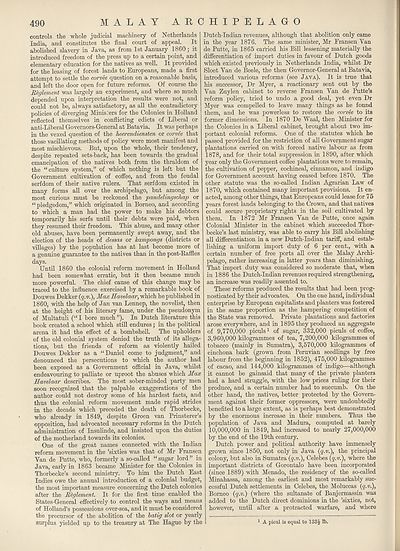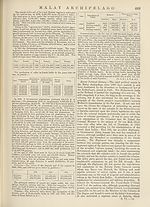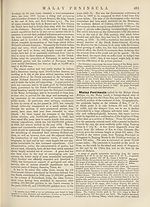New volumes of the Encyclopædia Britannica > Volume 30, K-MOR
(520) Page 490
Download files
Complete book:
Individual page:
Thumbnail gallery: Grid view | List view

490 MALAY ARCHIPELAGO
controls the whole judicial machinery of Netherlands
India, and constitutes the final court of appeal. It
abolished slavery in Java, as from 1st January 1860; it
introduced freedom of the press up to a certain point, and
elementary education for the natives as well. It provided
for the leasing of forest lands to Europeans, made a first
attempt to settle the corvee question on a reasonable basis,
and left the door open for future reforms. Of course the
Reglement was largely an experiment, and where so much
depended upon interpretation the results were not, and
could not be, always satisfactory, as all the contradictory
policies of diverging Ministers for the Colonies in Holland
reflected themselves in conflicting edicts of Liberal or
anti-Liberal Governors-General at Batavia. It was perhaps
in the vexed question of the heerendiensten or corvee that
those vacillating methods of policy were most manifest and
most mischievous. But, upon the whole, their tendency,
despite repeated sets-back, has been towards the gradual
emancipation of the natives both from the thraldom of
the “culture system,” of which nothing is left but the
Government cultivation of coffee, and from the feudal
serfdom of their native rulers. That serfdom existed in
many forms all over the archipelago, but among the
most curious must be reckoned the pandelingschap or
“ pledgedom,” which originated in Borneo, and according
to which a man had the power to make his debtors
temporarily his serfs until their debts were paid, when
they resumed their freedom. This abuse, and many other
old abuses, have been permanently swept away, and the
election of the heads of dessas or kampongs (districts or
villages) by the population has at last become more of
a genuine guarantee to the natives than in the post-Raffles
days.
Until 1860 the colonial reform movement in Holland
had been somewhat erratic, but it then became much
more powerful. The chief cause of this change may be
traced to the influence exercised by a remarkable book of
Douwes Dekker (q.v.), Max Havelaar, which he published in
1860, with the help of Jan van Lennep, the novelist, then
at the height of his literary fame, under the pseudonym
of Multatuli (“ I bore much ”). In Dutch literature this
book created a school which still endures; in the political
arena it had the effect of a bombshell. The upholders
of the old colonial system denied the truth of its allega¬
tions, but the friends of reform as violently hailed
Douwes Dekker as a “Daniel come to judgment,” and
denounced the persecutions to which the author had
been exposed as a Government official in Java, whilst
endeavouring to palliate or uproot the abuses which Max
Havelaar describes. The most sober-minded party men
soon recognized that the palpable exaggerations of the
author could not destroy some of his hardest facts, and
thus the colonial reform movement made rapid strides
in the decade which preceded the death of Thorbecke,
who already in 1849, despite Groen van Prinsterer’s
opposition, had advocated necessary reforms in the Dutch
administration of Insulinde, and insisted upon the duties
of the motherland towards its colonies.
One of the great names connected with the Indian
reform movement in the ’sixties was that of Mr Fransen
Van de Putte, who, formerly a so-called “ sugar lord ” in
Java, early in 1863 became Minister for the Colonies in
Thorbecke’s second ministry. To him the Dutch East
Indies owe the annual introduction of a colonial budget,
the most important measure concerning the Dutch colonies
after the Reglement. It for the first time enabled the
States-General effectively to control the ways and means
of Holland’s possessions over-sea, and it must be considered
the precursor of the abolition of the batig slot or yearly
surplus yielded up to the treasury at The Hague by the
Dutch-Indian revenues, although that abolition only came
in the year 1876. The same minister, Mr Fransen Yan
de Putte, in 1865 carried his Bill lessening materially the
differentiation of import duties in favour of Dutch goods
which existed previously in Netherlands India, whilst Dr
Sloet Yan de Beele, the then Governor-General at Batavia,
introduced various reforms (see Java). It is true that
his successor, Dr Myer, a reactionary sent out by the
Van Zuylen cabinet to reverse Fransen Yan de Putte’s
reform policy, tried to undo a good deal, yet even Dr
Myer was compelled to leave many things as he found
them, and he was powerless to restore the corvee to its
former dimensions. In 1870 De Waal, then Minister for
the Colonies in a Liberal cabinet, brought about two im¬
portant colonial reforms. One of the statutes which he
passed provided for the restriction of all Government sugar
plantations carried on with forced native labour as from
1878, and for their total suppression in 1890, after which
year only the Government coffee plantations were to remain,
the cultivation of pepper, cochineal, cinnamon, and indigo
for Government account having ceased before 1870. The
other statute was the so-called Indian Agrarian Law of
1870, which contained many important provisions. It en¬
acted, among other things, that Europeans could lease for 75
years forest lands belonging to the Crown, and that natives
could secure proprietary rights in the soil cultivated by
them. In 1872 Mr Fransen Van de Putte, once again
Colonial Minister in the cabinet which succeeded Thor¬
becke’s last ministry, was able to carry his Bill abolishing
all differentiation in a new Dutch-Indian tariff, and estab¬
lishing a uniform import duty of 6 per cent., with a
certain number of free ports all over the Malay Archi¬
pelago, rather increasing in latter years than diminishing,
That import duty was considered so moderate that, when
in 1886 the Dutch-Indian revenues required strengthening,
an increase was readily assented to.
These reforms produced the results that had been prog¬
nosticated by their advocates. On the one hand, individual
enterprise by European capitalists and planters was fostered
in the same proportion as the hampering competition of
the State was removed. Private plantations and factories
arose everywhere, and in 1895 they produced an aggregate
of 9,770,000 piculs1 of sugar, 332,000 piculs of coffee,
3,960,000 kilogrammes of tea, 7,200,000 kilogrammes of
tobacco (mainly in Sumatra), 3,570,000 kilogrammes of
cinchona bark (grown from Peruvian seedlings by free
labour from the beginning in 1852), 475,000 kilogrammes
of cacao, and 144,000 kilogrammes of indigo—although
it cannot be gainsaid that many of the private planters
had a hard struggle, with the low prices ruling for their
produce, and a certain number had to succumb. On the
other hand, the natives, better protected by the Govern¬
ment against their former oppressors, were undoubtedly
benefited to a large extent, as is perhaps best demonstrated
by the enormous increase in their numbers. Thus the
population of Java and Madura, computed at barely
10,000,000 in 1849, had increased to nearly 27,000,000
by the end of the 19th century.
Dutch power and political authority have immensely
grown since 1850, not only in Java (q.v.), the principal
colony, but also in Sumatra (q.v.), Celebes (q.v.), where the
important districts of Gorontalo have been incorporated
(since 1889) with Menado, the residency of the so-called
Minahassa, among the earliest and most remarkably suc¬
cessful Dutch settlements in Celebes, the Moluccas (q.v.),
Borneo (q.v.) (where the sultanate of Banjermassin was
added to the Dutch direct dominions in the ’sixties, not,
however, until after a protracted warfare, and where
1 A picul is equal to 133J H>.
controls the whole judicial machinery of Netherlands
India, and constitutes the final court of appeal. It
abolished slavery in Java, as from 1st January 1860; it
introduced freedom of the press up to a certain point, and
elementary education for the natives as well. It provided
for the leasing of forest lands to Europeans, made a first
attempt to settle the corvee question on a reasonable basis,
and left the door open for future reforms. Of course the
Reglement was largely an experiment, and where so much
depended upon interpretation the results were not, and
could not be, always satisfactory, as all the contradictory
policies of diverging Ministers for the Colonies in Holland
reflected themselves in conflicting edicts of Liberal or
anti-Liberal Governors-General at Batavia. It was perhaps
in the vexed question of the heerendiensten or corvee that
those vacillating methods of policy were most manifest and
most mischievous. But, upon the whole, their tendency,
despite repeated sets-back, has been towards the gradual
emancipation of the natives both from the thraldom of
the “culture system,” of which nothing is left but the
Government cultivation of coffee, and from the feudal
serfdom of their native rulers. That serfdom existed in
many forms all over the archipelago, but among the
most curious must be reckoned the pandelingschap or
“ pledgedom,” which originated in Borneo, and according
to which a man had the power to make his debtors
temporarily his serfs until their debts were paid, when
they resumed their freedom. This abuse, and many other
old abuses, have been permanently swept away, and the
election of the heads of dessas or kampongs (districts or
villages) by the population has at last become more of
a genuine guarantee to the natives than in the post-Raffles
days.
Until 1860 the colonial reform movement in Holland
had been somewhat erratic, but it then became much
more powerful. The chief cause of this change may be
traced to the influence exercised by a remarkable book of
Douwes Dekker (q.v.), Max Havelaar, which he published in
1860, with the help of Jan van Lennep, the novelist, then
at the height of his literary fame, under the pseudonym
of Multatuli (“ I bore much ”). In Dutch literature this
book created a school which still endures; in the political
arena it had the effect of a bombshell. The upholders
of the old colonial system denied the truth of its allega¬
tions, but the friends of reform as violently hailed
Douwes Dekker as a “Daniel come to judgment,” and
denounced the persecutions to which the author had
been exposed as a Government official in Java, whilst
endeavouring to palliate or uproot the abuses which Max
Havelaar describes. The most sober-minded party men
soon recognized that the palpable exaggerations of the
author could not destroy some of his hardest facts, and
thus the colonial reform movement made rapid strides
in the decade which preceded the death of Thorbecke,
who already in 1849, despite Groen van Prinsterer’s
opposition, had advocated necessary reforms in the Dutch
administration of Insulinde, and insisted upon the duties
of the motherland towards its colonies.
One of the great names connected with the Indian
reform movement in the ’sixties was that of Mr Fransen
Van de Putte, who, formerly a so-called “ sugar lord ” in
Java, early in 1863 became Minister for the Colonies in
Thorbecke’s second ministry. To him the Dutch East
Indies owe the annual introduction of a colonial budget,
the most important measure concerning the Dutch colonies
after the Reglement. It for the first time enabled the
States-General effectively to control the ways and means
of Holland’s possessions over-sea, and it must be considered
the precursor of the abolition of the batig slot or yearly
surplus yielded up to the treasury at The Hague by the
Dutch-Indian revenues, although that abolition only came
in the year 1876. The same minister, Mr Fransen Yan
de Putte, in 1865 carried his Bill lessening materially the
differentiation of import duties in favour of Dutch goods
which existed previously in Netherlands India, whilst Dr
Sloet Yan de Beele, the then Governor-General at Batavia,
introduced various reforms (see Java). It is true that
his successor, Dr Myer, a reactionary sent out by the
Van Zuylen cabinet to reverse Fransen Yan de Putte’s
reform policy, tried to undo a good deal, yet even Dr
Myer was compelled to leave many things as he found
them, and he was powerless to restore the corvee to its
former dimensions. In 1870 De Waal, then Minister for
the Colonies in a Liberal cabinet, brought about two im¬
portant colonial reforms. One of the statutes which he
passed provided for the restriction of all Government sugar
plantations carried on with forced native labour as from
1878, and for their total suppression in 1890, after which
year only the Government coffee plantations were to remain,
the cultivation of pepper, cochineal, cinnamon, and indigo
for Government account having ceased before 1870. The
other statute was the so-called Indian Agrarian Law of
1870, which contained many important provisions. It en¬
acted, among other things, that Europeans could lease for 75
years forest lands belonging to the Crown, and that natives
could secure proprietary rights in the soil cultivated by
them. In 1872 Mr Fransen Van de Putte, once again
Colonial Minister in the cabinet which succeeded Thor¬
becke’s last ministry, was able to carry his Bill abolishing
all differentiation in a new Dutch-Indian tariff, and estab¬
lishing a uniform import duty of 6 per cent., with a
certain number of free ports all over the Malay Archi¬
pelago, rather increasing in latter years than diminishing,
That import duty was considered so moderate that, when
in 1886 the Dutch-Indian revenues required strengthening,
an increase was readily assented to.
These reforms produced the results that had been prog¬
nosticated by their advocates. On the one hand, individual
enterprise by European capitalists and planters was fostered
in the same proportion as the hampering competition of
the State was removed. Private plantations and factories
arose everywhere, and in 1895 they produced an aggregate
of 9,770,000 piculs1 of sugar, 332,000 piculs of coffee,
3,960,000 kilogrammes of tea, 7,200,000 kilogrammes of
tobacco (mainly in Sumatra), 3,570,000 kilogrammes of
cinchona bark (grown from Peruvian seedlings by free
labour from the beginning in 1852), 475,000 kilogrammes
of cacao, and 144,000 kilogrammes of indigo—although
it cannot be gainsaid that many of the private planters
had a hard struggle, with the low prices ruling for their
produce, and a certain number had to succumb. On the
other hand, the natives, better protected by the Govern¬
ment against their former oppressors, were undoubtedly
benefited to a large extent, as is perhaps best demonstrated
by the enormous increase in their numbers. Thus the
population of Java and Madura, computed at barely
10,000,000 in 1849, had increased to nearly 27,000,000
by the end of the 19th century.
Dutch power and political authority have immensely
grown since 1850, not only in Java (q.v.), the principal
colony, but also in Sumatra (q.v.), Celebes (q.v.), where the
important districts of Gorontalo have been incorporated
(since 1889) with Menado, the residency of the so-called
Minahassa, among the earliest and most remarkably suc¬
cessful Dutch settlements in Celebes, the Moluccas (q.v.),
Borneo (q.v.) (where the sultanate of Banjermassin was
added to the Dutch direct dominions in the ’sixties, not,
however, until after a protracted warfare, and where
1 A picul is equal to 133J H>.
Set display mode to:
![]() Universal Viewer |
Universal Viewer | ![]() Mirador |
Large image | Transcription
Mirador |
Large image | Transcription
Images and transcriptions on this page, including medium image downloads, may be used under the Creative Commons Attribution 4.0 International Licence unless otherwise stated. ![]()
| Encyclopaedia Britannica > New volumes of the Encyclopædia Britannica > Volume 30, K-MOR > (520) Page 490 |
|---|
| Permanent URL | https://digital.nls.uk/193574261 |
|---|
| Attribution and copyright: |
|
|---|---|
| Shelfmark | EB.18 |
|---|---|
| Description | Ten editions of 'Encyclopaedia Britannica', issued from 1768-1903, in 231 volumes. Originally issued in 100 weekly parts (3 volumes) between 1768 and 1771 by publishers: Colin Macfarquhar and Andrew Bell (Edinburgh); editor: William Smellie: engraver: Andrew Bell. Expanded editions in the 19th century featured more volumes and contributions from leading experts in their fields. Managed and published in Edinburgh up to the 9th edition (25 volumes, from 1875-1889); the 10th edition (1902-1903) re-issued the 9th edition, with 11 supplementary volumes. |
|---|---|
| Additional NLS resources: |
|

